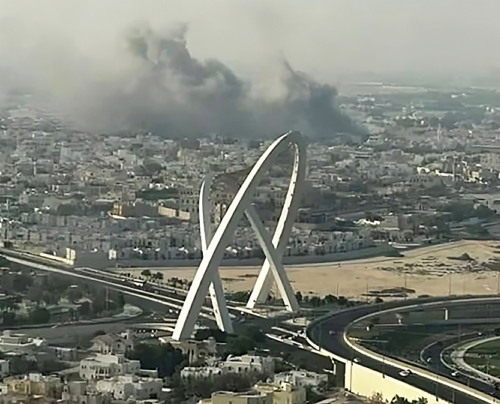Best Free Resources for Traders in 2025: From Charts to AI Alerts
December 01 , 2025

Explore Israel’s recent deadly airstrike in Qatar, its impact on Hamas, regional diplomacy, and international relations. Understand the geopolitical and security consequences of this unprecedented attack.
On September 9, 2025, Israel carried out a deadly airstrike in Doha, Qatar, targeting senior Hamas leaders. The operation marked an unprecedented escalation in the Middle East, as it directly involved a Gulf state that has traditionally served as a mediator in Israel-Hamas negotiations. The attack has not only caused casualties but also sparked international condemnation, heightened tensions across the region, and raised urgent questions about the future of Middle East diplomacy.
The Israeli airstrike, reportedly named "Atzeret HaDin" or "Day of Judgement," involved 15 fighter jets striking a residential compound in the Leqtaifiya district of Doha. According to Israeli sources, the operation targeted a meeting of senior Hamas leaders who were discussing a potential U.S.-mediated ceasefire in Gaza. Among the casualties were six individuals, including the son of Hamas leader Khalil al-Hayya, his office director, and several bodyguards, alongside a Qatari security officer. Hamas leadership survived, according to official statements.
This strike was unusual for several reasons. First, it directly involved Qatar, a Gulf nation with longstanding diplomatic ties to Hamas. Second, it bypassed the usual channels of international consultation, creating friction with key allies, including the United States. Third, the operation demonstrated Israel’s willingness to project military power far beyond its borders, challenging assumptions about regional security and restraint.
The airstrike prompted swift and vocal reactions from governments and organizations around the world:
These reactions highlight the delicate balance of power in the Middle East. While Israel may have achieved a tactical objective, the strategic implications are far-reaching, with diplomatic relations and regional stability now under threat.
The strike has significant implications for the Middle East:
While the strike targeted leadership figures, the human cost extends beyond the immediate casualties. Families of the victims face psychological trauma and uncertainty. The broader population in Doha, and particularly the Qatari security forces, now confront heightened anxiety and fear of future strikes. Such military actions have long-term societal consequences that affect not only those directly involved but also local communities and international relations.
The legality of Israel’s strike is under scrutiny. Critics argue that attacking foreign territory without explicit authorization breaches international law and violates principles of state sovereignty. The ethics of targeting leaders in a country serving as a mediator are also questioned, raising concerns about the proportionality and morality of such military actions.
Proponents of the strike argue that Hamas is a terrorist organization actively engaged in attacks against Israel. From this perspective, eliminating leadership is a legitimate measure of self-defense and counterterrorism. However, balancing these actions against diplomatic norms and civilian protection remains contentious.
Qatar has long facilitated dialogue between Israel and Hamas. By targeting leaders in Doha, Israel has jeopardized these ongoing negotiations, creating uncertainty over the potential for a ceasefire. The airstrike complicates international mediation efforts, as other stakeholders may now view Qatar as a vulnerable or compromised actor in peace talks.
Furthermore, mistrust between parties may deepen. Hamas may perceive the strike as a betrayal or aggression, leading to hardline stances, while Israel risks criticism from allies for acting unilaterally. In such a climate, achieving meaningful dialogue becomes significantly more challenging.
The strike underscores Israel’s willingness to operate beyond its borders, signaling a potential shift in regional strategy. It also raises questions about the role of international oversight and the efficacy of traditional diplomatic mechanisms. With Qatar’s sovereignty challenged, other nations in the Gulf may recalibrate alliances and security policies.
At the same time, global powers such as the United States, Russia, and China must navigate a delicate balance between condemning aggressive action and maintaining relations with both Israel and Qatar. The incident highlights the interconnected nature of Middle East diplomacy, where a single military action can trigger ripple effects across the region.
News outlets worldwide have extensively covered the airstrike, with images and reports shaping public perception. In Israel, the strike is largely portrayed as a defensive measure, whereas international media emphasize the breach of sovereignty and regional risk. Public opinion in the Middle East is polarized, with some viewing Israel’s action as necessary counterterrorism, while others see it as an escalation threatening regional stability.
Social media has amplified these narratives, allowing citizens, journalists, and political commentators to debate the strike in real time. These discussions influence public sentiment and can impact diplomatic decisions in the coming weeks and months.
The situation remains fluid. Possible scenarios include:
Ultimately, the resolution of this crisis will depend on the willingness of all parties to engage in dialogue and adhere to international norms.
Israel’s deadly strike on Qatar represents a significant escalation in Middle East tensions, with profound implications for diplomacy, security, and regional stability. While it may achieve immediate tactical objectives against Hamas leadership, the broader geopolitical consequences are complex and potentially destabilizing. The international community will need to carefully monitor developments, encourage dialogue, and work toward de-escalation to prevent further conflict and preserve prospects for peace in the region.
#IsraelQatarStrike #MiddleEastConflict #GazaCeasefire #InternationalRelations #QatarSovereignty #RegionalStability #HamasLeadership #MiddleEastDiplomacy #Geopolitics #IsraelDefense